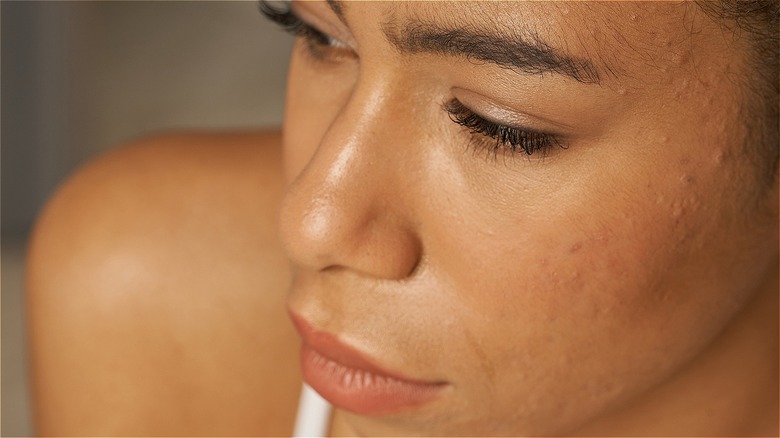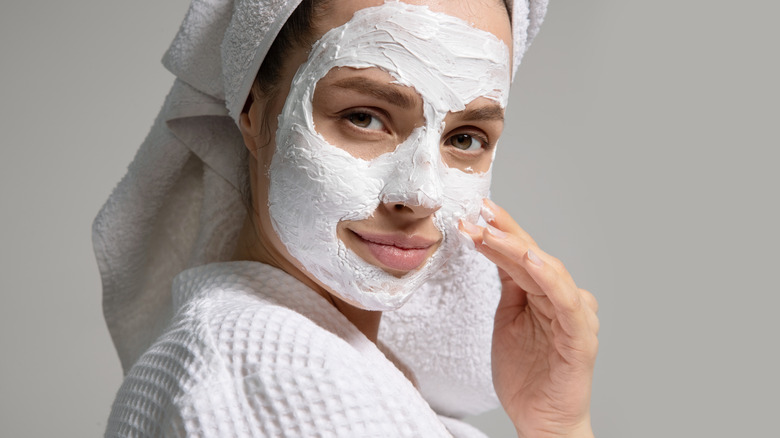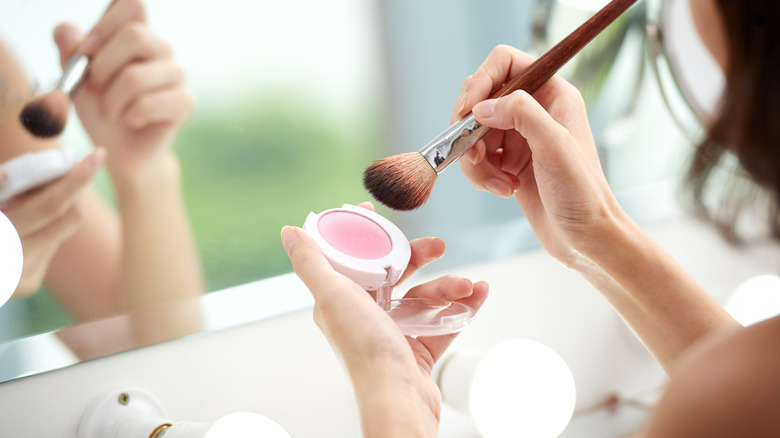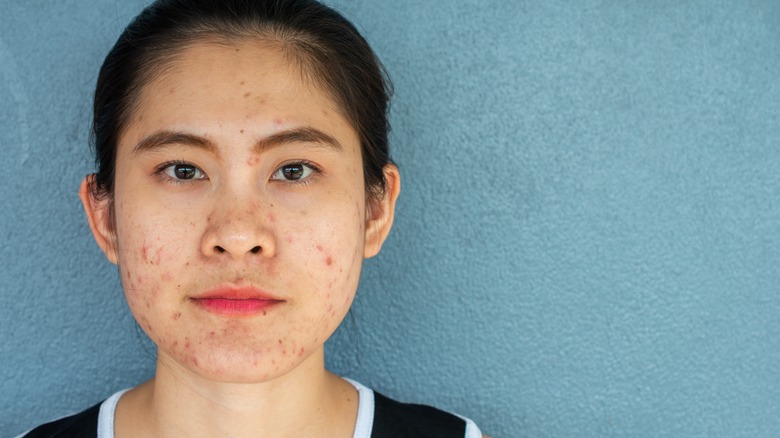Here's Why You May Be Getting Acne Breakouts On Your Cheeks
Although acne is something people with all skin types have to manage at one point or another, dealing with cheek breakouts in particular can be the bane of one's existence. For one, it's more obvious than a few blemishes on the forehead of chin. But even more frustrating is the fact that sometimes it can be difficult to determine what's actually causing it, especially if you already stick to a regular wash routine. Most of us were likely told that T-zone acne was a byproduct of puberty, but cheek acne — especially in adulthood — is a totally different ballpark.
Whether your cheek acne is a new situation or you are fed up with a seemingly systemic problem, you'll want to take a look at all the ways the skin on your cheeks are trying to communicate with you. Skin has the ability to communicate with us by outwardly revealing an inward issue that might indicate the need for attention. Plus, the way you treat acne on your cheeks isn't necessarily the same as you would treat acne on your body. Eliminating potential triggers and properly cleansing whatever comes near those cheeks will help, as well as understanding and accepting more about how not-so-imperfect your skin actually is. If you could ask your skin why it has acne on it's cheeks, here are some of the things it might have to say.
Constant contact
It can be easy to overlook how our seemingly mindless habits could be impacting our skin. But the truth is, if you're dealing with stubborn cheek breakouts (especially if they're not showing up anywhere else), it's worth reevaluating your own behaviors. Because while touching your skin doesn't necessarily cause acne, it can exacerbate it, especially if that touching turns to picking or scratching.
On top of that, we hate to be the one to tell you this, but your phone is probably a lot dirtier than you think. One study of phones that were swabbed and tested found they contained as much germs as the inside of a bathroom stall. "With each phone call, we reintroduce these germs onto our skin, clogging our pores and leading to eventual breakouts," dermatologist Shereene Idriss told Allure. Try using cordless headphones for your calls and steer clear of touching the side of your face as you place the ear buds into the ear canal.
But it's not just our fingers that are to blame. Is your cheek acne limited to one side of your face? Might be time to wash your bedding, as your pillow case can also worsen cheek breakouts if you're not washing it very often. Meanwhile, you surgical mask could be contributing to maskne, a widespread problem for many, especially medical professionals. If your mask is made from cotton, try switching to a fabric less absorbent and known for holding in more moisture like satin or silk.
Cosmetic culprits
Once you've cleaned up obvious external offenders, take a look at your skin care and makeup habits. When was the last time you washed your makeup brushes? Are you reusing the same sponges without cleaning them? Makeup brushes and sponges can become a breeding ground for acne-causing bacteria if they aren't properly disinfected between use. The American Academy of Dermatology recommends washing makeup brushes at the minimum once a week and sponges after every use.
Now, if you're already consistent about your tool cleaning, it's worth considering whether the makeup you're using could be breaking you out. Talc, acrylic, perfumes, and dyes are common comedogenic ingredients in cosmetics and also a known offenders for those suffering from breakouts. If you're avoiding these ingredients, it may be worth checking if your foundation, concealer, or blush is expired. Many preservatives in makeup lose effectiveness past their best-by date, which makes them susceptible to different bacteria. If you're putting this on your face, you're putting your skin at risk for developing irritation and breakouts.
Are you replacing or cleaning your washcloth enough? Should you ditch it altogether? Are you certain the cleanser, astringent, and moisturizer is right for the season? When your cheek acne flairs up, are you over treating them with acne medications or retinols that are just making things worse? Take the time to experiment and track any differences.
Input determines output
Although most hormonal acne occurs along the jawline, it's definitely possible for it to show up on the lower part of the cheeks as well. People who menstruate can develop whiteheads or black heads as a result of hormonal changes during their cycle, as well as more serious conditions like PCOS. Acne can also be tell-tale sign that your hormones are unbalanced. Typically, this is due to an excess of androgens, which increase oil levels on the skin.
But it's not just hormones that could be affecting your face. When it comes to the correlation between nutrition and its affects on our skin, during an interview with Forbes, expert Dr. Perricone explained how his work is based on his years of research and how directly our skin reflects what we are putting in our bodies. He said, "I believed inflammation to be the key to the whole process of disease of every type." Indeed, research has supported this statement. One 2020 study of over 24,000 adults by JAMA Dermatology found that individuals who regularly consumed high levels of sugar were more likely to have acne.
That said, understanding how what we ingest interacts with our systems, can make a huge difference in the struggle for clearer skin. Talk to your dermatologist to learn more about how you can best appreciate and take care of the skin.



